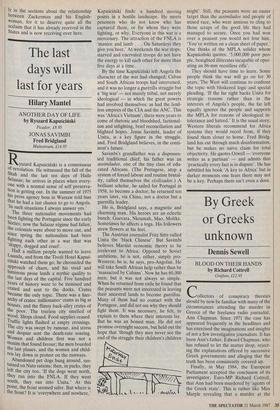The last days will last for years
Hilary Mantel
ANOTHER DAY OF LIFE by Ryszard Kapu§chiski
Picador, £8.95
JONAS SAVIMBI Fred Bridgland
Mainstream, £14.95
Ryszard Kapugcifiski is a connoisseur of revolution. He witnessed the fall of the Shah and the last ten days of Haile Selassie; he arrives in places when every- one with a normal sense of self preserva- tion is getting out. In the summer of 1975 Ins press agency boss in Warsaw told him ,that he had a last chance to go to Angola. In such situations I always answer yes.' The three nationalist movements had been fighting the Portugese since the early Sixties; now the Salazar regime had fallen, the colonists were about to move out, and since spring the nationalists had been fighting each other in a war that was sloppy, dogged and cruel'. Half a million people wanted to leave Luanda, and from the Tivoli Hotel Kapug- cuiski watched them go; he chronicled the approach of chaos, and his vivid and luminous prose lends a mythic quality to the last days of the capital. Five hundred years of history were to be itemised and Crated and sent to the docks. Crates became the only topic. There was a hier- archy of crates: millionaires' crates as big as houses, and the flimsy back-alley crates of the poor. The treeless city smelled of Wood. Shops closed. Food supplies ceased. Traffic lights flashed at empty crossings. The city was swept by rumour, and stress and despair sent the death-rate soaring. Women and children first was not a maxim that found favour; the men boarded the last planes, and the women and child- ren lay down in protest on the runways. Abandoned pet dogs hung around, sus- tained on Nato rations; then, in packs, they left the city too. 'If the dogs went north, they ran into the FNLA. If they went south, they ran into Unita.' At this point, the front seemed safer. But where is the front? It is 'everywhere and nowhere,' Kapugcifiski finds: a hundred moving points in a hostile landscape. He meets prisoners who do not know who has captured them, or for whom they were fighting, or why. Everyone in this war is a mercenary. The attraction of the FNLA is `manioc and lamb . . . On Saturdays they give you beer.' At weekends the war stops; starved and enervated troops do not have the energy to kill each other for more than five days at a time.
By the time Kapugcifiski left Angola the character of the war had changed; Cuban and South African troops had intervened, and it was no longer a guerrilla struggle but a 'big war' — not merely tribal, not merely ideological — in which the great powers had involved themselves: as had the land- less empires of the CIA and the ANC. This was 'Africa's Vietnam'; there were years to come of rhetoric and bloodshed, factional- ism and infighting, brief reconciliation and blighted hopes. Jonas Savimbi, leader of Unita, is a key figure in the struggle, and, Fred Bridgland believes, in the conti- nent's future.
Savimbi's grandfather was a disposses- sed traditional chief; his father was an assimilados, one of the tiny class of edu- cated Africans. (The Portugese, atop a system of forced labour and routine brutal- ity, called themselves the civilizados.) A brilliant scholar, he sailed for Portugal in 1958, to become a doctor; he returned ten years later, via China, not a doctor but a guerrilla leader.
He is, Bridgland says, a magnetic and charming man. His heroes are an eclectic bunch: Guevara, Nkrumah, Mao, Moltke. Sometimes he affects a toga. His followers strew flowers at his feet.
The Austrian journalist Fritz Sitte called Unita the 'black Chinese'. But Savimbi believes Marxist economic theory to be irrelevant to Africa. Opposed to Soviet ambitions, he is not, either, simply pro- Western; he is, he says, pro-Angolan. He will take South African help rather than be `massacred by Cubans'. Now he has 60,000 men; but it was not always so simple. When he returned from exile he found that the peasants were not interested in leaving their ancestral lands to become guerillas. Many of them had no contact with the Portugese, and did not see why they should fight them. It was necessary," he felt, to explain to them where their interests lay. But he was an honest man. He did not promise overnight success, but held out the hope that 'though they may never see the end of the struggle their children's children might'. Still, the peasants were an easier target than the assimilados and people of mixed race, who were anxious to cling to those scraps of the good life they had managed to secure. Once you had won over a peasant you would not lose him, `You've written on a clean sheet of paper.' One thinks of the MPLA solider whom Kapugcifiski quotes: '5,000,000 poor peo- ple, benighted illiterates incapable of opera ating an 86-mm recoilless rifle'.
They should have time to learn. Some people think the war will go on for 30 years. The West will continue to confront the topic with blinkered logic and special pleading. `If the far right backs Unita for strategic reasons rather than in the interests of Angola's people, the far left equally ignores the people and supports the MPLA for reasons of ideological in- tolerance and hatred.' It is the usual story; Western liberals recommend for Africa systems they would recoil from, if they found them closer to home. Fred Bridg- land has cut through much disinformation, but he makes no naive claim for total objectivity. He quotes Orwell — 'everyone writes as a partisan' — and admits that `practically every fact is in dispute'. He has subtitled his book 'A key to Africa' but in darker moments one fears there may not be a key. Perhaps there isn't even a door.


















































 Previous page
Previous page